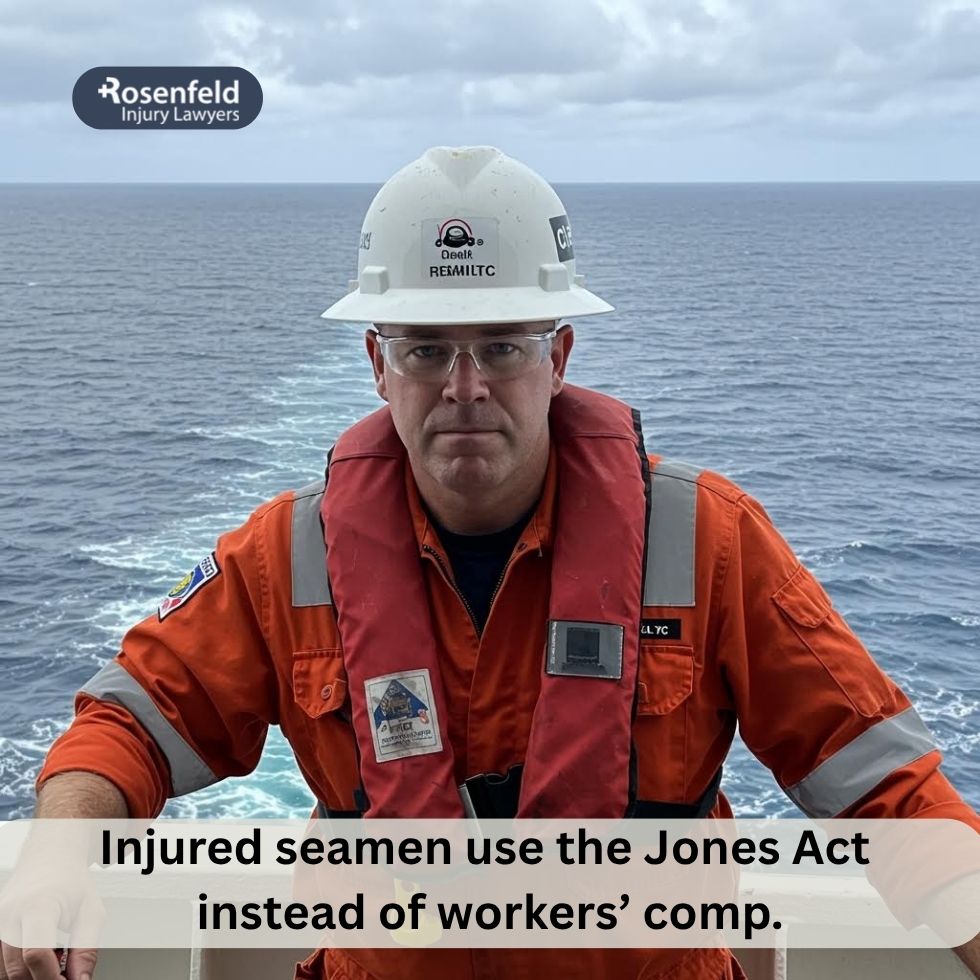Committed to Protecting the
Rights of Injured Workers
A Chicago Jones Act lawyer from our team will aggressively advocate for injured workers to receive maximum compensation under federal law. Through diligent investigation and expert negotiation, we hold employers accountable for negligent acts while recovering fair settlements that will cover your needs. Contact a Chicago-based work injury lawyer today for a free consultation about your legal rights.

We are top-rated personal injury lawyers and proud members of the American Association for Justice. Having helped over 5,000 clients and secured over $490 million in damages, we have an A+ rating with the Better Business Bureau and a 10/10 AVVO rating. You can rely on us for fierce advocacy and invaluable legal advice throughout the lawsuit process.
Formally known as the Merchant Marine Act of 1920, the Jones Act applies to seamen who are injured while working on a boat, ship, or other seafaring vessel. This term includes anyone who spends at least 30% of their employment aboard a navigable ship. In Chicago, this would include:
The act’s intended purpose is to allow injured workers to raise claims against their employer or fellow employees for work-related injuries (46 U.S.C. § 30104). Unlike other aspects of maritime law, individuals have the right to a jury trial in state or federal court when making a claim.
Getting hurt while working doesn’t just cause high medical bills, but also prevents you from enjoying life. Common Jones Act injuries our attorneys see include:
These lawsuits work similarly to civil claims, allowing seamen to seek both economic and non-economic damages:
“Maintenance” refers to your living expenses, such as rent, food, and utilities, while “cure” is all reasonable acts to improve your medical condition, such as surgery and physical therapy. You are owed these regardless of any negligence, but many employers will attempt to cut you off early, making it crucial that you work with our experienced attorneys.
The average settlement in Jones Act cases is $6,962,750, while the median settlement is $2,870,000.
One seaman working on a jon boat near the Adams Street Bridge in downtown Chicago, supervising his co-workers, suffered major damage to his shoulder when a barge slammed into the boat. His lawyers proved that the barge was traveling too fast and that his employer had not complied with the law. As such, he was awarded $8,055,000.00.
With these cases, you must prove negligence and that you were hurt during the course of your employment. A company or the vessel’s owner will do everything possible to prevent you from receiving fair compensation, and they will use the law to insist they are not liable.
By working with a skilled maritime attorney, you can maximize your chances of a reasonable settlement that covers your medical needs.
From 2022 to 2023, 18 people drowned in Chicago waterways. While not all of these were maritime workers, several were employed at the time of their passing, emphasizing the serious risks of drowning deaths. Nationwide, maritime worker injury statistics reveal the water transportation industry had a non-fatal injury rate of 1.8 total recordable cases per 100 workers in 2023, and 10 people passed away.
Lake Michigan: 13 people have died on Lake Michigan in 2025 alone, making it one of the deadliest waterways in the state.
Mississippi River: This major transportation route is known for its locks and dams, which can malfunction or lead to collisions.
Illinois River: Though a smaller waterway, this river sees hundreds of ships per day.
Chicago River: Connecting Lake Michigan to the Mississippi River, the Chicago River is a major thoroughfare for cargo ships and recreational boats.
Jones Act lawsuits are governed by federal admiralty law, specifically the Merchant Marine Act of 1920 (46 U.S.C. § 30104). Under this law, seamen can sue their employer when they are injured on a navigable vessel.
It is crucial that the vessel be navigable, meaning that it is used for transportation along waterways, to have a valid case (Hutton v. Consol. Grain & Barge Co.). These cases may be tried in federal or state courts, depending on jurisdiction.
Per the Jones Act statute of limitations, you have three years to file a lawsuit if you were injured while working on a navigable vessel (46 U.S.C. § 30106).
To ensure that you have the best possible chance of compensation, follow these steps as soon as possible:

We will assist you in every aspect of your case, from consultation to trial representation. Our nationally recognized attorneys can help with the following needs:
Our top-rated attorneys work on a contingency fee basis for all maritime employees, ensuring they receive fair compensation. Contact us to book a free consultation.
Content reviewed by Chicago work accident lawyer Jonathan Rosenfeld of Rosenfeld Injury Lawyers LLC, who holds employers, contractors, and third-party defendants accountable to recover compensation for injured workers, and is a trial lawyer recognized by the Illinois Trial Lawyers Association, the Illinois Workers Compensation Bar Association, and America’s Top 100 High Stakes Litigators.